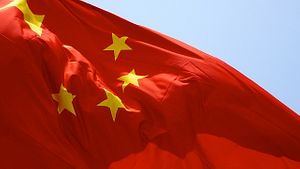Just over a week ago, a Taiwanese citizen stood in a central Chinese courthouse and plead guilty to subverting state power. Videos of Lee Ming-che’s trial were swiftly posted to the Court’s Weibo account and excerpts screened on the national news channel, CCTV.
Lee’s televised trial is the latest in a string of CCP-orchestrated media “productions” from distressing footage of imprisoned Nobel Laureate Liu Xiaobo’s dying moments and funeral this July to the scores of televised confessions of pre-trial suspects on national TV that began in 2013, just a few months after Chinese President Xi Jinping took the helm. Such public humiliation has not been seen since the vengeful political orgies of the Mao era.
When North Korea, Iran, or other “rogue” regimes broadcast such “show” trials, they arouse global indignation. But Lee’s trial earned little more than a whimper.
On the video, two police officers in white gloves steer Lee to his place at the front of the courthouse. This stocky man, a community college worker in Taiwan and long-time pro-democracy campaigner, in his crisp white shirt, head freshly “convict” shaved, and wearing glasses, is 42 years old, yet that day he looked like a scared schoolboy.
Lee and his fellow defendant, Peng Yuhua, may have been dressed in pressed shirts and trousers, the trial may have been conducted in a sombre courthouse with brass nameplates and a trio of gavel-wielding, black-jacketed judges, and footage and transcripts neatly posted online, but as little justice was seen in the Yueyang Intermediate People’s Court that day as at any Cultural Revolution-era struggle session.
In some respects Lee’s trial was even worse because it had been given a “civilized” veneer.
Dressed up to look like due process and inserted with well-worn slices of anti-foreigner propaganda and pro-CCP messaging, the posted video excerpts were greeted with praise from Chinese netizens, who congratulated the court for being “open” and “transparent” and for defending their motherland.
Earlier this year, I completed a study of the 40 confessions by pre-trial suspects broadcast between 2013 and 2016 on Chinese national TV and a few other Beijing-connected media. Lee’s courtroom appearance was eerily similar to the confessions in that study. His “script” was different only in that it included statements of support for Taiwan’s unification with China.
Another disturbing parallel is the use of what I called the “supporting confessor,” a suspect whose role appeared simply to inform on and/or denigrate the “main” target. This could be the “main” suspect in the confession or an off-screen target (such as a 2014 confession video of three students of imprisoned Uighur scholar Ilham Tohti, who talked only of their teacher’s “crimes”). Supporting confessors were used in 17 of the 40 confession broadcasts studied (aired between 2013 and 2016).
Lee, too, appeared to have his own supporting confessor. Although the spotlight in this case was firmly on the Taiwanese activist, appearing alongside him was fellow defendant, a Chinese national called Peng Yuhua. Chinese activists said they had never heard of him before and suspected he was there simply to put pressure on Lee.
As well as analyzing the confession scripts, I also conducted interviews with some of those who had confessed on television. Their answers revealed that it was routine to memorize “lines,” get in “costume,” and “act” in front of the camera, sometimes for retake after retake. They were scripted and staged “show” confessions; acts of forced theater for use as propaganda and punishment.
My research concluded that the confessions were not simply about repressing human rights activists; rather they were also about generating public support for such repression by encouraging Chinese viewers to see Western values as anti-China.
These broadcasts criminalize efforts to claim or protect so-called Western universal values by painting them as anti-China. Confessions by human rights lawyers discrediting rights defense were aimed at getting the Chinese viewer to see rights defense work as criminal and anti-China; confessions by Hong Kong booksellers were aimed at getting the Chinese viewer to see the practice of a free press as criminal and anti-China; and in Lee’s case, his confession is aimed at getting the Chinese viewer to see promoting democracy as criminal and anti-China.
And that anti-universal value mandate should worry all of us. In a world, where the CCP occupies an ever-enlarging sphere of influence and is driven by a clear political agenda that is “corroding democracies,” that is helping to export its censorship model overseas, and globalize its propagandized media, how can we afford to look the other way? Yet, Lee’s trial merely garnered some short-lived global media coverage, but no official condemnation.
If we want to understand China and if we care about how China’s rise will affect all of us, the televised confessions could have told us plenty. Lee’s trial is yet another warning bell. How is it then that we are failing to hear it?
Dinah Gardner is a former freelance reporter from Beijing 2005 to 2013 and recently graduated graduate student at Taiwan’s National Chengchi University.

































